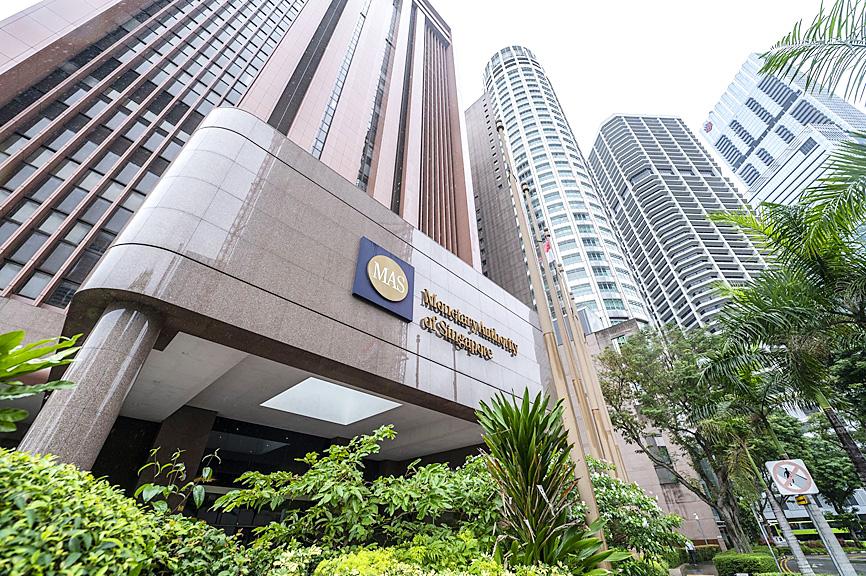The Monetary Authority of Singapore yesterday proposed a slate of environmental, social and governance (ESG) regulations for financial institutions and listed companies, demonstrating the goal to align with emerging international standards, and to accommodate Asian countries’ persistent need for financing in heavy-emitting and fossil fuel industries.
The central bank and Singapore Exchange Ltd are planning to require key financial institutions and listed companies to make ESG disclosures in line with rules being developed by the International Sustainability Standards Board (ISSB), Singaporean Deputy Prime Minister Lawrence Wong (黃循財) said.
The ISSB rules, established by the London-based International Financial Reporting Standards Foundation as a complement to its International Accounting Standards Board, are becoming a common template for Asian regulators.

Photo: Bloomberg
Hong Kong this month said it would mandate companies listed on its stock exchange to make climate disclosures based off the ISSB framework. China, which is considering making disclosures mandatory, has allowed the foundation to open a Beijing office to promote ISSB standards there.
At the same time, Singapore is introducing a raft of measures to encourage transition finance in Asia.
The central bank’s sustainable debt grant schemes would include bonds and loans designed to assist heavy industries such as steel and cement in becoming more energy efficient and shrink their greenhouse gas emissions.
In Europe, which has been the global leader on green finance and ESG regulation, transition instruments are often viewed with skepticism. Banks that finance carbon-intensive industries have to account for those emissions in their disclosures, and proponents of aggressive action on climate change say that transition funding lets polluters off the hook.
Asian countries and regulators have pushed back, saying that the transition away from fossil fuels would be very expensive — and is largely a solution to a problem for which they bear little historical responsibility.
“No amount of new green projects will get us to net zero,” Wong said. “We need to resolve everything that’s existing today and especially in Asia, where 60 percent of the electricity is generated by coal plants. So how do we bring about a more orderly and responsible phasing out of coal plants in Asia, while safeguarding the lives and livelihoods of people in this region.”
The central bank is also working with the International Energy Agency to develop decarbonization pathways for emissions-heavy sectors in the region.
Wong said such pathways would help financial institutions “reference these pathways when they set emissions reduction targets, and when they engage with their clients on initiatives to decarbonize their businesses.”
Wong said that Singapore would work to increase blended finance for phasing out coal-fired power plants and other transition activities.
Southeast Asian states last month released an updated version of a taxonomy that included the phasing out of coal assets.
The central bank is also developing a code of conduct for firms like MSCI Inc and S&P Global Inc that provide ESG ratings and data, and wants them to disclose how transition risks are factored into their products.

South Korea’s equity benchmark yesterday crossed a new milestone just a month after surpassing the once-unthinkable 5,000 mark as surging global memory demand powers the country’s biggest chipmakers. The KOSPI advanced as much as 2.6 percent to a record 6,123, with Samsung Electronics Co and SK Hynix Inc each gaining more than 2 percent. With the benchmark now up 45 percent this year, South Korea’s stock market capitalization has also moved past France’s, following last month’s overtaking of Germany’s. Long overlooked by foreign funds, despite being undervalued, South Korean stocks have now emerged as clear winners in the global market. The so-called “artificial intelligence

NEW IDENTITY: Known for its software, India has expanded into hardware, with its semiconductor industry growing from US$38bn in 2023 to US$45bn to US$50bn India on Saturday inaugurated its first semiconductor assembly and test facility, a milestone in the government’s push to reduce dependence on foreign chipmakers and stake a claim in a sector dominated by China. Indian Prime Minister Narendra Modi opened US firm Micron Technology Inc’s semiconductor assembly, test and packaging unit in his home state of Gujarat, hailing the “dawn of a new era” for India’s technology ambitions. “When young Indians look back in the future, they will see this decade as the turning point in our tech future,” Modi told the event, which was broadcast on his YouTube channel. The plant would convert

‘SEISMIC SHIFT’: The researcher forecast there would be about 1.1 billion mobile shipments this year, down from 1.26 billion the prior year and erasing years of gains The global smartphone market is expected to contract 12.9 percent this year due to the unprecedented memorychip shortage, marking “a crisis like no other,” researcher International Data Corp (IDC) said. The new forecast, a dramatic revision down from earlier estimates, gives the latest accounting of the ongoing memory crunch that is affecting every corner of the electronics industry. The demand for advanced memory to power artificial intelligence (AI) tasks has drained global supply until well into next year and jeopardizes the business model of many smartphone makers. IDC forecast about 1.1 billion mobile shipments this year, down from 1.26 billion the prior

People stand in a Pokemon store in Tokyo on Thursday. One of the world highest-grossing franchises is celebrated its 30th anniversary yesterday.